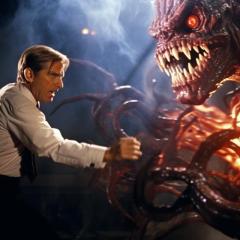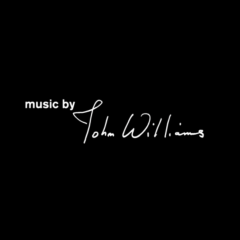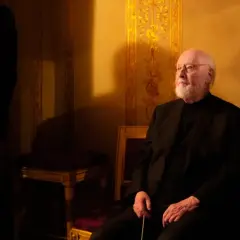-
Posts
3,705 -
Joined
-
Last visited
-
Days Won
22
Reputation Activity
-
 karelm got a reaction from Bayesian in I made a 27 minute documentary on Williams' The Battle Of Hoth (What happens when JW changes his mind?)
karelm got a reaction from Bayesian in I made a 27 minute documentary on Williams' The Battle Of Hoth (What happens when JW changes his mind?)
Very nice job! You could easily have made this a two-hour video of the entire cue and I hope you will. By the way, if you plan to expand this to other ESB cues, I typeset the Duel of the Sabers and Losing the Hand from the original sketches if you'd like them. It would be great if you also did the entire 14 minute Carbon Freeze sequence...hell, the whole film. To me, this might be JW at his greatest, his pinnacle.
-
 karelm reacted to Laserschwert in Official JWFan mock ups and fan-made recordings thread!
karelm reacted to Laserschwert in Official JWFan mock ups and fan-made recordings thread!
Now in full and complete, my re-arranged intro from "Indiana Jones and the Fate of Atlantis".
-
 karelm got a reaction from Yavar Moradi in I made a 27 minute documentary on Williams' The Battle Of Hoth (What happens when JW changes his mind?)
karelm got a reaction from Yavar Moradi in I made a 27 minute documentary on Williams' The Battle Of Hoth (What happens when JW changes his mind?)
Very nice job! You could easily have made this a two-hour video of the entire cue and I hope you will. By the way, if you plan to expand this to other ESB cues, I typeset the Duel of the Sabers and Losing the Hand from the original sketches if you'd like them. It would be great if you also did the entire 14 minute Carbon Freeze sequence...hell, the whole film. To me, this might be JW at his greatest, his pinnacle.
-
 karelm reacted to InTheCity in I made a 27 minute documentary on Williams' The Battle Of Hoth (What happens when JW changes his mind?)
karelm reacted to InTheCity in I made a 27 minute documentary on Williams' The Battle Of Hoth (What happens when JW changes his mind?)
I hope you enjoy.
likes and subscribes are welcomed
-
 karelm got a reaction from Mr. Hooper in Unexpected random encounters with the music of John Williams
karelm got a reaction from Mr. Hooper in Unexpected random encounters with the music of John Williams
What about this guy?
-
 karelm got a reaction from Brando in Unexpected random encounters with the music of John Williams
karelm got a reaction from Brando in Unexpected random encounters with the music of John Williams
What about this guy?
-
 karelm got a reaction from mstrox in E.T. THE EXTRA-TERRESTRIAL - Live to Projection Concerts
karelm got a reaction from mstrox in E.T. THE EXTRA-TERRESTRIAL - Live to Projection Concerts
It depends. One can argue silent films like 1924's Thief of Baghdad with an orchestral score composed by Mortimer Wilson to accompany the screenings beats it. But that was more like a ballet where the conductor was conducting the orchestral score to the film's scenes like they would where opera or ballet is accompanying the stage action. If you mean of modern scores intended purely for the scoring stage and not concert hall, then I think you're right it would be E.T. at the Shrine in 2002. That was a big deal then because it was kind of thought very difficult to pull off where now routinely done not only with major orchestras but by youth orchestras. Also, it was a bit frowned upon by major orchestras where now it's considered a very effective community engagement/profiteering option. You might enjoy this about orchestral scores that accompanied silent films: Restoring Original Orchestrations for Silent Film (nga.gov)
-
 karelm got a reaction from greenturnedblue in GALAXY'S EDGE - New John Williams composition (2018)
karelm got a reaction from greenturnedblue in GALAXY'S EDGE - New John Williams composition (2018)
It's a very big topic because there are multiple "forms". But listen to Beethoven Piano Sonatas for excellent example of structure and form. He wrote the book on classical form then destroyed it. Even his sonatinas (short sonatas) are brilliant examples of structure but frankly it takes a lot of study to expose these secrets. Maybe check out this basic example of Beethoven's Piano Sonata form:
In a way, you can think of it like Joseph Campbell's hero's journey story structure.
Many books have been written on this topic but you could sort of think of the hero's journey as story structure. Similarly, Sonata follows a dramatic structure:
For example, you would never start a story with the climax. Or end it by introducing the characters. True, story tellers can play around with the order of these events but if if you line them up chronologically, they will fall in to a similar pattern (Pulp Fiction for example). Similarly, you would start a sonata by introducing the theme (characters) and their dilemma. The story would continue throughout the movement as the theme faces drama and additional characters (secondary themes for example). The climax would be the point of ultimate drama followed by a resolution. Great stories manage the balance of all these elements.
Over centuries, artists try to stretch and challenge these classic structures but the goal is usually the same (tell a coherent drama with a satisfying resolution) though there are interpretive, individualistic, and stylistic approaches in how each composer does this.
-
 karelm got a reaction from Tom Guernsey in Elliot Goldenthal
karelm got a reaction from Tom Guernsey in Elliot Goldenthal
Elliot's Symphony No. 3 can be heard here:
Symphony No. 3 for Soprano and Orchestra to the poetry of Barbara Sadowska - PLAY KRAKÓW (playkrakow.com)
-

-
 karelm got a reaction from HunterTech in The Quick Question Thread
karelm got a reaction from HunterTech in The Quick Question Thread
Alan Silvestri once said the five most important skills for being a professional film composer are delivering on time, delivering on budget, delivering to technical requirements (7.1 vs 5.1, 48hz vs 96hz, 16 bit vs 24 bit, ProTools vs WAV, etc), timely revising when needed, and generally collaborative team player (supporting the director's vision and needs). He made a point that music quality wasn't one of them. If you write the best music ever heard but always miss your deadlines, you'll not make it as a professional film composer. Very, very few composers get the budgets to work like this where they get enough time to record what they want. The challenges are the film is always changing and sometimes the filmmakers will just edit the existing music producing poor music results. This is very problematic in thematic scores where a note is cut out or the theme chopped. So ideally, the composer would revise and maybe get a chance to edit it. Sometimes you don't know what was changed but what used to sync up no longer does. After umpteenth revisions of the same scene, other work piling on from perhaps other projects, schedule dragging and maybe the composer feeling the first version was the best and each revision is weaking it, it can certainly drive the composer crazy. Having a large staff can help soften this since they can delegate work to people, but the hired composer is still ultimately the one on the hook.
There are some composers who want to record several versions of the same cue with options such as cued instruments omitted in one take and playing in the other. This is to have options if the director says they're just not feeling the cue works in the sound dub, the composer can say how about this alternative, but this obviously increases the budget for the scoring, performance, and mixing. But having this option gives the composer an added sense of security that they're covered if feedback comes back later. It isn't unusual these days to do stripes (recording sections at a time rather than full ensembles at once) which also allows more options in post. What we're seeing is directors are piecing together a score with pieces but gives them more flexibility in the film than the composer being one of the story tellers with their own point of view.
-
 karelm got a reaction from GerateWohl in The Quick Question Thread
karelm got a reaction from GerateWohl in The Quick Question Thread
Alan Silvestri once said the five most important skills for being a professional film composer are delivering on time, delivering on budget, delivering to technical requirements (7.1 vs 5.1, 48hz vs 96hz, 16 bit vs 24 bit, ProTools vs WAV, etc), timely revising when needed, and generally collaborative team player (supporting the director's vision and needs). He made a point that music quality wasn't one of them. If you write the best music ever heard but always miss your deadlines, you'll not make it as a professional film composer. Very, very few composers get the budgets to work like this where they get enough time to record what they want. The challenges are the film is always changing and sometimes the filmmakers will just edit the existing music producing poor music results. This is very problematic in thematic scores where a note is cut out or the theme chopped. So ideally, the composer would revise and maybe get a chance to edit it. Sometimes you don't know what was changed but what used to sync up no longer does. After umpteenth revisions of the same scene, other work piling on from perhaps other projects, schedule dragging and maybe the composer feeling the first version was the best and each revision is weaking it, it can certainly drive the composer crazy. Having a large staff can help soften this since they can delegate work to people, but the hired composer is still ultimately the one on the hook.
There are some composers who want to record several versions of the same cue with options such as cued instruments omitted in one take and playing in the other. This is to have options if the director says they're just not feeling the cue works in the sound dub, the composer can say how about this alternative, but this obviously increases the budget for the scoring, performance, and mixing. But having this option gives the composer an added sense of security that they're covered if feedback comes back later. It isn't unusual these days to do stripes (recording sections at a time rather than full ensembles at once) which also allows more options in post. What we're seeing is directors are piecing together a score with pieces but gives them more flexibility in the film than the composer being one of the story tellers with their own point of view.
-
 karelm reacted to InTheCity in The Composer's Thread
karelm reacted to InTheCity in The Composer's Thread
The first CD i ever remember having was "The Very Best Of the Boston Pops" - tried to do some Golden age stuff mixed with the Williams Pops sound of that era
-
 karelm got a reaction from That_Bloke in Eddie Karam on Williams
karelm got a reaction from That_Bloke in Eddie Karam on Williams
It's fundamental economics. Each notation software excels in different areas. Sibelius is NOT great at complex scores like aleatoric music, compound meters (it still doesn't do it). It serves the common needs well that serves 95% of what users ask for but it isn't great with advanced notation. But it's a real struggle to produce a score like the attached. But that's not needed often, so it's the experts and connoisseurs who need that level of notation control. But who control's the features? It's like Microsoft Word probably does 1,000 features but 95% of its users only use a dozen features. That same sort of economics at play. Don't get me wrong, the attached image from Penderecki would be difficult to engrave regardless of what tool you use but some are better equipped for this type of advanced notation rare as it might be. For pro engravers, this is very important even though it's rarely asked for. It's sort of like how Adobe Photoshop can do anything you need for a photo but you almost never need all of that capability, it becomes the go to tool because anything you might need, it can do. But Sibelius is easier to use for most work. I haven't yet used Dorico but I hear it's a great balance between advanced notation and simplicity but the workflow (how you do common things) is unintuitive.
As for me, I think Finale, Sibelius, and Dorico are professional level tools. Each excel in different ways. You also need to be proficient in whatever tools your clients use.
-
 karelm reacted to enderdrag64 in Eddie Karam on Williams
karelm reacted to enderdrag64 in Eddie Karam on Williams
I've been listening to the Legacy of JW podcast recently while driving, I heard this interesting anecdote in the Conrad Pope episode:
He said that when John Williams first heard about HZ writing tons of music in 3 weeks he was like "how'd he do that", and someone told him he paid other people to do it for him, and Williams said "Oh I could never do that".
When James Horner heard the same story, and they told him HZ paid other people to write it, he said "Sounds expensive"
-
 karelm reacted to Glóin the Dark in What is the last piece of classical music you listened to?
karelm reacted to Glóin the Dark in What is the last piece of classical music you listened to?
Simpson Symphony No. 9
Unfortunately the individual CD tracks have been uploaded as separate videos, so there are lots of annoying breaks.
-

-
 karelm got a reaction from Tom in JURASSIC PARK - Live to Projection Concerts
karelm got a reaction from Tom in JURASSIC PARK - Live to Projection Concerts
Had a great time seeing this yesterday. Orchestra and film were great and there were lots of kids in the audience who probably have never seen it before based on the gasps and "oohhhh's" at certain scenes. The music must have been crazy difficult! On the same night, the LA Phil played E.T. live to picture with Johnny in the audience!!! He went on stage for a bow to thunderous ovation after. Just imagine Jurassic Park and E.T. live to picture in one day!
399024842_870077184559164_5150928013439168529_n.mp4 -
 karelm got a reaction from Brando in JURASSIC PARK - Live to Projection Concerts
karelm got a reaction from Brando in JURASSIC PARK - Live to Projection Concerts
Had a great time seeing this yesterday. Orchestra and film were great and there were lots of kids in the audience who probably have never seen it before based on the gasps and "oohhhh's" at certain scenes. The music must have been crazy difficult! On the same night, the LA Phil played E.T. live to picture with Johnny in the audience!!! He went on stage for a bow to thunderous ovation after. Just imagine Jurassic Park and E.T. live to picture in one day!
399024842_870077184559164_5150928013439168529_n.mp4 -
 karelm got a reaction from Marian Schedenig in Video Game Music
karelm got a reaction from Marian Schedenig in Video Game Music
He was my classmate and told me how much those projects meant to him. We literally talked about how big a fan he is.
-
 karelm reacted to Marian Schedenig in Video Game Music
karelm reacted to Marian Schedenig in Video Game Music
It's a game that very easily could be turned into a film, because it's so character driven to begin with. Only that would feel a bit pointless, because it would probably just be the game without the game. But if Schafer hadn't written it as a game, it would have made a great film instead.
Its story is also so complete that despite many cries for a sequel, and despite me wanting to visit that world and its characters again, I don't see a place for it (and neither does Schafer, I think).
It's art:
-
 karelm reacted to Marian Schedenig in Video Game Music
karelm reacted to Marian Schedenig in Video Game Music
The game itself celebrates its 25th anniversary today. And it's still one of the best, a rare case of a game that feels unique and personal enough to be called a masterpiece.
-
 karelm got a reaction from bored in The Composer's Thread
karelm got a reaction from bored in The Composer's Thread
Nice job! I love the ambition! Some of it reminded me of Shore's score for Lord of the Rings.
-
 karelm reacted to Marian Schedenig in Video Game Music
karelm reacted to Marian Schedenig in Video Game Music
The remastered/extended/DC edition of Peter McConnell's brilliant Grim Fandango soundtrack has another limited pressing on vinyl:
https://www.iam8bit.com/collections/grim-fandango/products/grim-fandango-2xlp-vinyl-soundtrack
-
 karelm reacted to bored in The Composer's Thread
karelm reacted to bored in The Composer's Thread
Haven't posted here in a while, because I finally finished my first orchestral album! It's for my friend's novel called The Devil-Bearer. It's a dark fantasy/revenge story sort of combination, so I decided to make a symphonic, heavily thematic album based on it since I enjoyed it so much. Think How To Train Your Dragon, Studio Ghibli, Lord of the Rings, and a little bit of Harry Potter.
https://williamslobodnik.bandcamp.com/album/the-devil-bearer-vol-1-original-book-soundtrack




.thumb.png.99648892217b423e18fe027415380d39.png)



.thumb.png.5b28fec809ed98cdb936b9cabf2d6323.png)



.thumb.jpg.75d0bef92fd5d333326cad21f3788748.jpg)